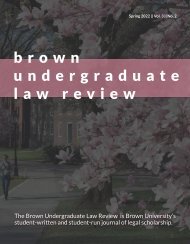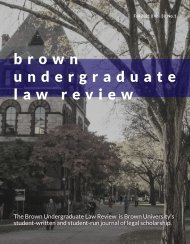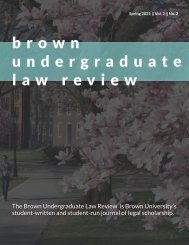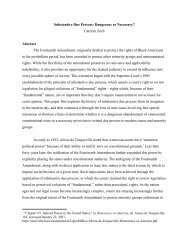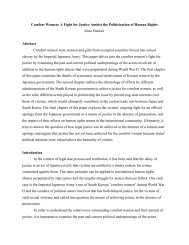Brown Undergraduate Law Review -- Vol. 2, No. 1 (Fall 2020)
We are proud to present the Brown Undergraduate Law Review's Fall 2020 issue. We hope you will all find our authors' works fascinating and thought-provoking.
We are proud to present the Brown Undergraduate Law Review's Fall 2020 issue. We hope you will all find our authors' works fascinating and thought-provoking.
You also want an ePaper? Increase the reach of your titles
YUMPU automatically turns print PDFs into web optimized ePapers that Google loves.
Was Privacy a Mistake? An Examination of Privacy, Liberty, and Equality in Reproductive Freedom
through the granting of reproductive autonomy in
Griswold v. Connecticut (1965). In this case, the Supreme
Court ruled that the Constitution protects the right of
marital privacy against state restrictions on contraception.
In the opinion of the court, Justice William O. Douglas
wrote that ?various guarantees create zones of privacy?
within the Bill of Rights. 2 In the court?s decision, privacy
The right to privacy was first employed as a negative right
through the granting of reproductive autonomy in
Griswold v. Connecticut (1965). In this case, the Supreme
Clause of the Fourteenth Amendment, concurring opinions
written by Justices John Marshall Harlan, Byron White,
and Arthur Goldberg did. Justice Harlan writes,
In my view, the proper constitutional inquiry in this
case is whether this Connecticut statute infringes the
Due Process Clause of the Fourteenth Amendment
because the enactment violates basic values ?implicit
in the concept of ordered liberty?. . . . The Due Process
Clause of the Fourteenth Amendment stands, in my
opinion, on its own bottom. 4
Court ruled that the Constitution protects the right of
marital privacy against state restrictions on contraception.
In the opinion of the court, Justice William O. Douglas
wrote that ?various guarantees create zones of privacy?
within the Bill of Rights. In the court?s decision, privacy
rights were found to exist within the First Amendment?s
provision of the right to association, the Third
Amendment?s prohibition on the quartering of soldiers in
?any house? during peacetime without the consent of the
owner, and the Fourth Amendment?s affirmation of
people?s rights to be secure in their persons, houses,
papers, and effects, and against unreasonable searches and
seizures. Privacy rights were also derived from the Fifth
This opinion reflects the beginning of the court?s
movement towards understanding privacy as a positive
right derived from liberty.
The right to liberty grants individuals the ability to
exercise the provisions enumerated in the Constitution or
available under natural law, while also implying both a
broader sense of individual autonomy from restrictions and
individual empowerment. The establishment of liberty can
be found in both the Fifth and Fourteenth Amendments of
the Constitution. The Fifth Amendment says to the federal
government that no one shall be ?deprived of life, liberty
or property without due process of law,? and the
Amendment?s self-incrimination clause, and within the Fourteenth Amendment extends the obligation of
Ninth Amendment?s provision that ?[t]he enumeration in
the Constitution, of certain rights, shall not be construed to
deny or disparage other retained by the people.? 3 The
court?s official ruling in this case establishes privacy as a
maintaining Due Process to the states. 6 7 In what follows, I
will demonstrate how privacy rights are inherently
intertwined with and derived from liberty as established by
the Fifth Amendment and applied to states by the Due
negative right? a protection against governmental Process Clause of the Fourteenth Amendment in cases of
interference, not one of affirmative entitlement.
reproductive freedom and sexual intercourse.
While the Griswold court did not formally derive privacy
rights from liberty as established in the Due Process
In Roe v. Wade (1973), Planned Parenthood v. Casey
(1992), and Lawrence v. Texas (2003), the right to privacy
2. Griswold v. Connecticut, 381 U.S. 484 (1965).
3. Ibid.
4. Ibid., 381 U.S. 500.
5. ?Liberty Law and Legal Definition,? USLegal, airSlate Legal Forms, Inc., accessed May 7, 2020, https://definitions.uslegal.com/l/liberty/.
6. ?Due Process,? Legal Information Institute, Cornell University Law School, accessed May 7, 2020, https://www.law.cornell.edu/wex/due_process.
7. Ibid.
Brown Undergraduate Law Review
44




